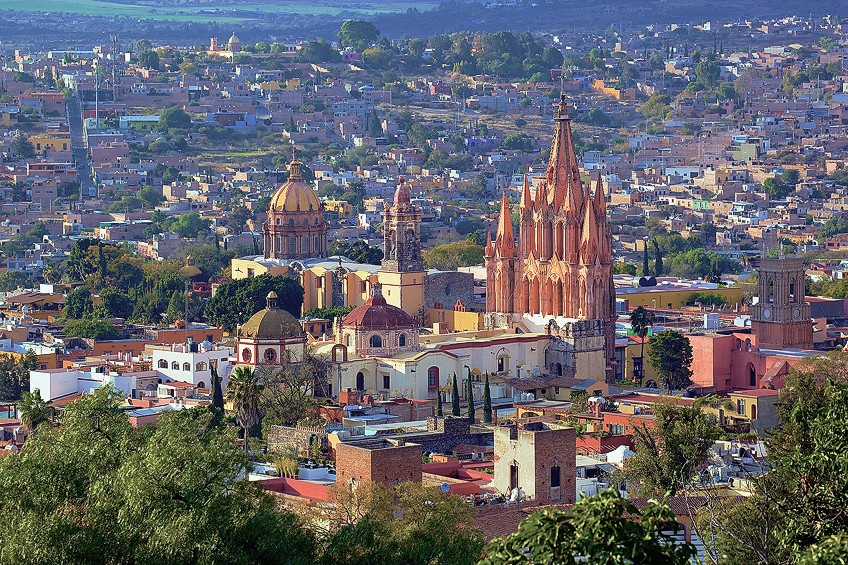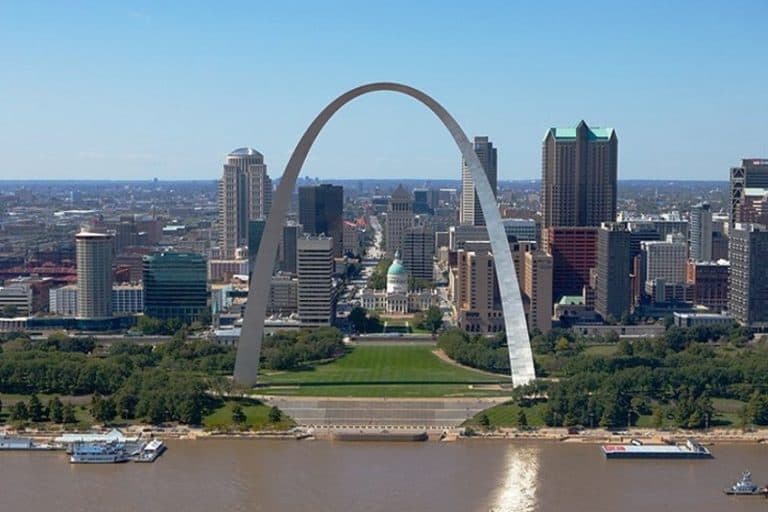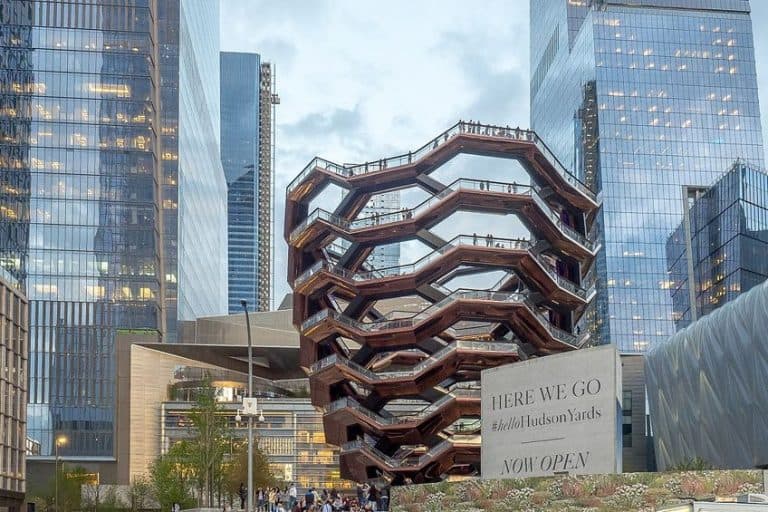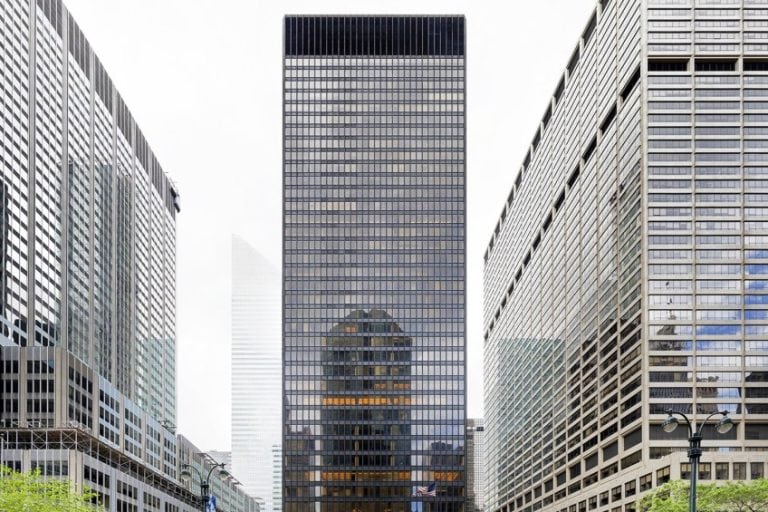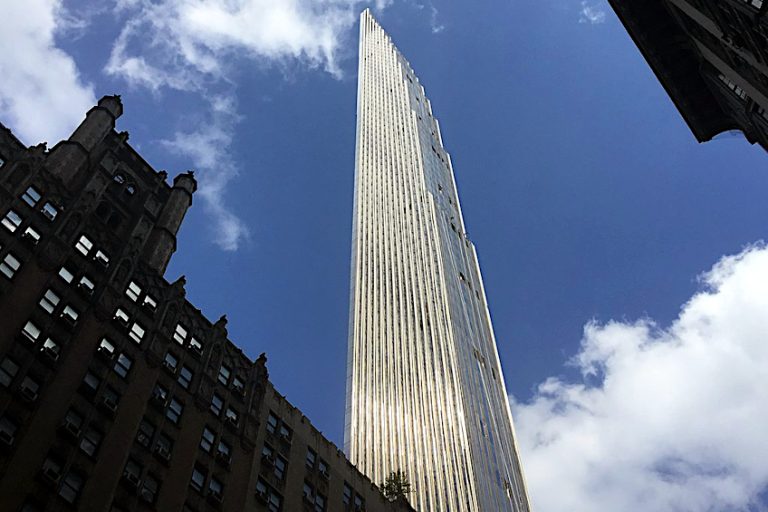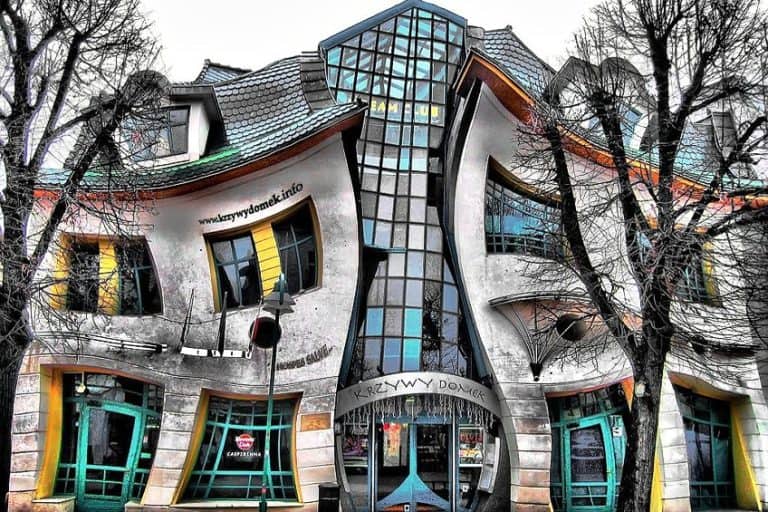Parroquia De San Miguel Arcángel – A Spiritual Oasis
The Parroquia De San Miguel Arcángel church is a historic landmark situated in the Mexican city of San Miguel de Allende. It is also known as the Iglesia San Miguel Arcángel, Catedral de San Miguel, and San Miguel Church. It is presently the city’s primary icon, as well as one of the most prominent religious buildings in the country.
Table of Contents
Exploring the Parroquia De San Miguel Arcángel Church
| Architect | Marco Antonio Sobrarias (c. 18th century) |
| Date Completed | 1709 |
| Height (meters) | Unspecified |
| Function | Church |
| Location | San Miguel de Allende, Mexico |
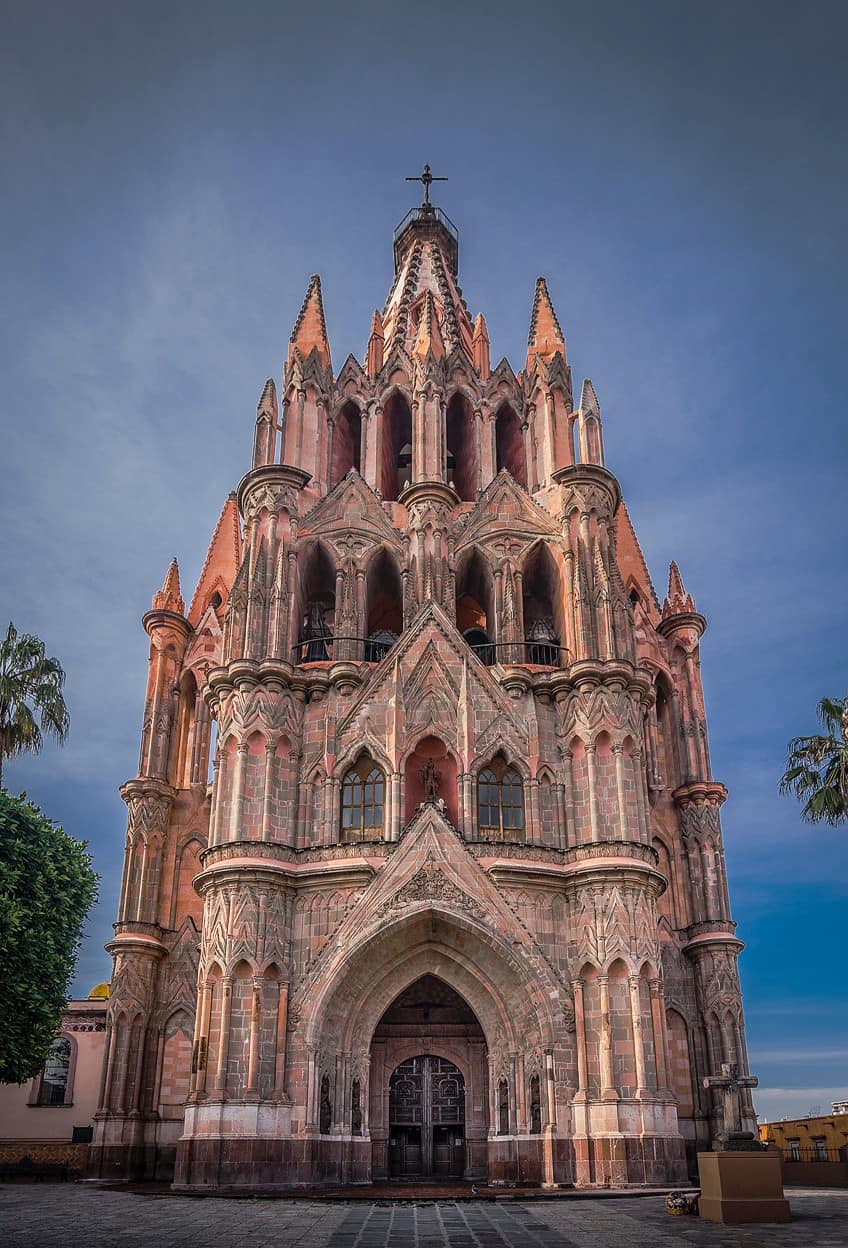
Iglesia San Miguel Arcángel is a Roman Catholic church and it was dedicated to the Archangel Saint Michael. Many regard the Catedral de San Miguel to be one of Mexico’s most beautiful churches. The San Miguel Church continues to attract thousands of tourists annually. Let’s find out more about the history and architecture of Parroquia De San Miguel Arcángel church.
The History and Architecture of Iglesia San Miguel Arcangel
The Catedral de San Miguel is one of Mexico’s most photographed cathedrals, with its two great towers visible from most areas of the city. The original Mexican exterior was built in the 17th century, and the current Gothic facade was completed by Zeferino Gutierrez in 1880, a local self-taught architect and bricklayer. Gutierrez’s inspiration is reported to have come from lithographs and postcards of European Gothic churches; nonetheless, it is clearly his personal interpretation of the style and is more of a product of his imagination than a true reproduction.
A little atrium is enclosed by a wrought iron fence in front of this facade. In the atrium, there is a memorial honoring Bishop José Mara de Jess Diez de Sollano y Davalos.
To the side of the parish is where you’ll find the San Rafael Church which was established in 1742 by Luis Felipe Neri de Alfaro. The main facade is divided into two levels, with the first level including pilasters, arches, floral patterns, and a frieze. The choir window on the second level is framed with pink sandstone. The bell tower is Moorish in style. According to tradition, this ancient church was the location of San Miguel’s first Christian ceremony.
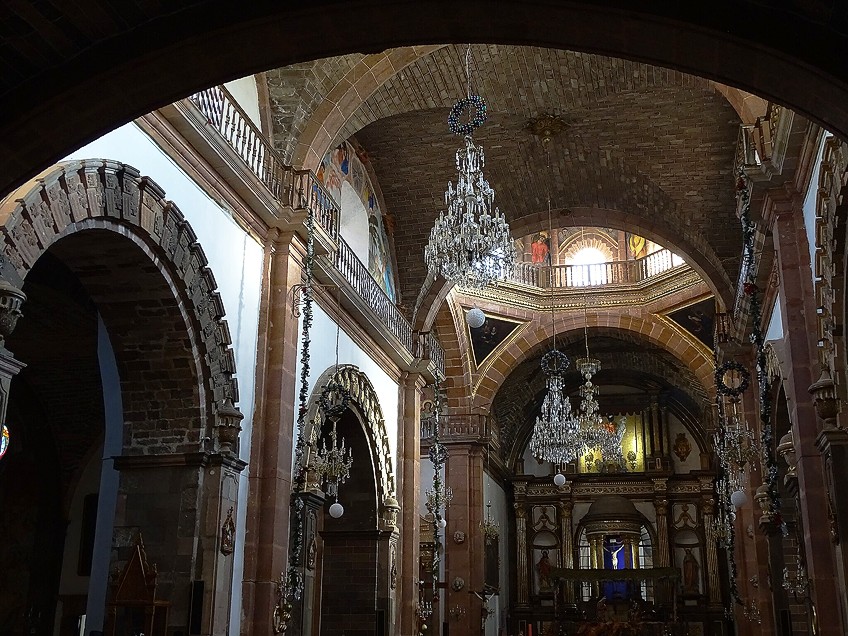 Interior of the Parish of San Miguel Arcángel; Adam Jones from Kelowna, BC, Canada, CC BY-SA 2.0, via Wikimedia Commons
Interior of the Parish of San Miguel Arcángel; Adam Jones from Kelowna, BC, Canada, CC BY-SA 2.0, via Wikimedia Commons
A plaque at the main church’s entryway reveals that Miguel Hidalgo y Costilla and Jose Joaquin (his brother) served as clergy here. Another one recognizes Gutierrez’s contribution to the facade of the church. The inside of the San Miguel church has its original 17th-century layout and internal architecture, although due to looting multiple times over Mexico’s history, most of its adornment has been damaged or removed.
However, the Senor de la Conquista, made of cornstalk paste by the local indigenous peoples in Michoacán, is a notable image here.
The Iglesia San Miguel Arcangel played an essential role in the Mexican Revolution in the 20th century. The revolutionary forces utilized the church as a hospital and military headquarters, and it incurred substantial damage throughout the struggle. The church fell in disarray after the revolution and required extensive restoration work. The restoration effort took several decades and included a multitude of undertakings such as repairing the church’s deteriorated structure, replacing its stained-glass windows, and restoring its elegant interior.
21st Century Restoration Works of San Miguel Church
The renovation of the Catedral de San Miguel started in October 2019. The project included the repair of the Parish’s two domes: one dome from the 17th century and another that had been constructed in the 18th century, in addition to furniture restoration. The restoration team’s coordinator, Claudia Escalante, revealed that renovations were done to 280 square meters in total, including the church’s main structure and the vaults, and the entire building received general maintenance. The operations also included cleaning, waterproofing, the removal of a decommissioned electrical infrastructure, and the renovation of the doorways and side rooms, where pigeons caused issues.
Escalante noted that the external rehabilitation was completed in December, but the restoration of the furnishings took a bit longer because it was a highly complex procedure.
The 18th-century dome, which can be seen when going down Aldama Street, still had its original ornamental painting, which was badly damaged, with peeling, pictorial sections at risk, and about to collapse because of the dampness on the roofs. The damage was extensive, particularly in the domes. Rainwater and mildew had ruined the architectural elements, particularly in the interiors.
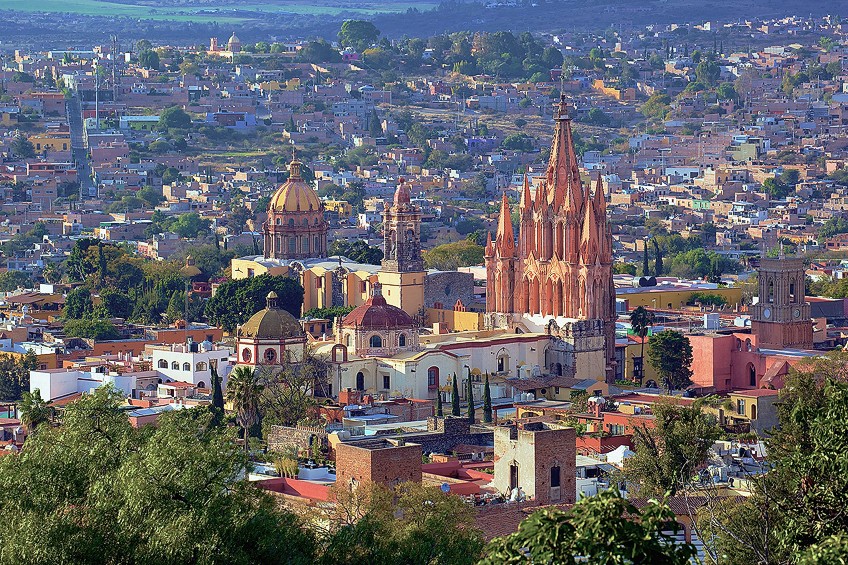 Panoramic view of San Miguel de Allende, with the Parish of San Miguel Arcángel; https://www.flickr.com/photos/jiuguangw/, CC BY-SA 2.0, via Wikimedia Commons
Panoramic view of San Miguel de Allende, with the Parish of San Miguel Arcángel; https://www.flickr.com/photos/jiuguangw/, CC BY-SA 2.0, via Wikimedia Commons
The parish remained open, although it was necessary to install special scaffolding inside, which stayed in place while the construction was underway. To complete the task, they needed federal government licenses and permissions, as well as a huge team of local restorers who specialized in the field of wall painting.
The National Institute of Anthropology and History delegated these responsibilities to professionals in architecture as well as religious art and antique furniture repair.
Other Features of Parroquia De San Miguel Arcángel Church
A little crypt beneath the altar is accessible by a small door to the right. This tomb houses the ashes of past church bishops and luminaries, including a former Mexican president. Every year on the 2nd of November, the Day of the Dead, the tomb is open to the general public. The Plaza Allende, the main garden, commonly called Jardin Principal, is located in front of the church complex.
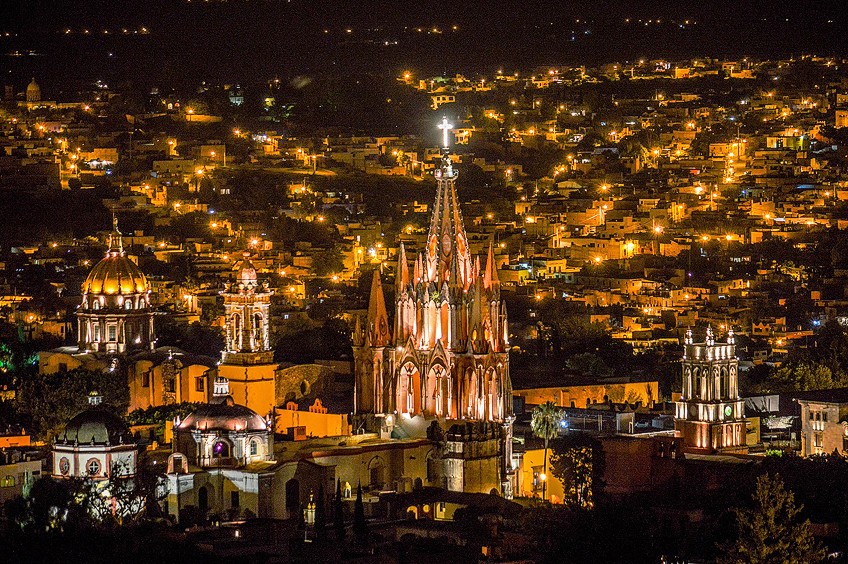 Night view of the Parish of San Miguel Arcángel; Luis uriel correa, CC BY-SA 4.0, via Wikimedia Commons
Night view of the Parish of San Miguel Arcángel; Luis uriel correa, CC BY-SA 4.0, via Wikimedia Commons
It was created in the French manner, complete with Indian laurel trees and wrought iron seating. On weekends, musicians regularly perform in the kiosk, making it a popular location to sit and relax. Aside from the parish, several significant structures overlook the park, including the Canal House, Ignacio Allende House, and the municipal palace.
Visiting the Iglesia San Miguel Arcangel
The Catedral de San Miguel is open to the public and is a famous tourist attraction. The church has no entrance price, and visitors are welcome to explore its gorgeous interior and enjoy its exquisite architecture. Visitors may explore the church’s stunning interior, which combines Mexican baroque and neo-gothic architectural styles.
The church is famous for its beautiful stained-glass windows depicting episodes from Saint Michael the Archangel’s life.

Visitors are encouraged to attend Mass and other religious events in the Parroquia De San Miguel Arcángel Church, which is an active religious site. Tourists may walk or take a cab from the city center to the San Miguel Church. It is centrally positioned in San Miguel de Allende and is easy to reach from most areas of the city. For the most up-to-date information on visitation hours and other details, always consult the church’s website before going.
The original Iglesia San Miguel Arcángel, established in the late 17th century, was a simple structure. This all improved in 1880 when master stone mason Zeferino Gutierrez was contracted to design a new facade. Gutierrez, a self-taught architect, was said to have drawn inspiration for the project from sketches, engravings, and postcards of European churches. The ensuing neo-gothic fantasy, with soaring towers visible from practically everywhere in town, has made this parish one of Mexico’s most photographed churches.
Frequently Asked Questions
Where Is the Catedral De San Miguel?
The San Miguel Church is located in the Mexican state of Guanajuato, in the city of San Miguel de Allende, which is regarded as a historically and culturally significant city. Many well-preserved colonial-style structures, like churches and villas, give the city a distinct and appealing ambiance. San Miguel de Allende has a fascinating history that dates back to the colonial period. Parroquia De San Miguel Arcángel Church was designated a National Monument in 1926 after playing an important part in Mexico’s independence.
What Style of Architecture Is the Catedral De San Miguel?
The Catedral De San Miguel is a unique architectural mix of Mexican baroque and neo-gothic styles. Mexican baroque, which emerged during the colonial period, is distinguished by rich embellishment, grandiose facades, and the use of bright colors. The neo-gothic style is distinguished by ribbed vaults, pointed arches, and flying buttresses, all of which can be seen in the cathedral’s design. San Miguel Church combines these two styles, with aspects of Mexican baroque seen in its intricate embellishment and complex facade, and aspects of neo-gothic visible in its ribbed vaults and pointed arches. This one-of-a-kind combination of styles visible in Parroquia De San Miguel Arcángel Church results in a distinct and stunning architectural marvel that is a must-see for anybody traveling to San Miguel de Allende.
Who Is Parroquia De San Miguel Arcángel Church Dedicated To?
Iglesia San Miguel Arcangel is dedicated to Saint Michael the Archangel. In Jewish, Christian, and Islamic faiths, Saint Michael is one of the archangels, and he is typically represented as a warrior angel who confronts evil and defends the faithful. Saint Michael is the patron saint of warriors, medics, and law enforcement officers, among others, in the Catholic Church. The church is also named after Saint Michael, and its interior images of the saint include stained-glass windows depicting incidents from his life. The dedication of the church to Saint Michael emphasizes the saint’s long-standing importance in the spiritual lives of the inhabitants of San Miguel de Allende.
Justin van Huyssteen is a freelance writer, novelist, and academic originally from Cape Town, South Africa. At present, he has a bachelor’s degree in English and literary theory and an honor’s degree in literary theory. He is currently working towards his master’s degree in literary theory with a focus on animal studies, critical theory, and semiotics within literature. As a novelist and freelancer, he often writes under the pen name L.C. Lupus.
Justin’s preferred literary movements include modern and postmodern literature with literary fiction and genre fiction like sci-fi, post-apocalyptic, and horror being of particular interest. His academia extends to his interest in prose and narratology. He enjoys analyzing a variety of mediums through a literary lens, such as graphic novels, film, and video games.
Justin is working for artincontext.org as an author and content writer since 2022. He is responsible for all blog posts about architecture, literature and poetry.
Learn more about Justin van Huyssteen and the Art in Context Team.
Cite this Article
Justin, van Huyssteen, “Parroquia De San Miguel Arcángel – A Spiritual Oasis.” Art in Context. September 8, 2023. URL: https://artincontext.org/parroquia-de-san-miguel-arcangel/
van Huyssteen, J. (2023, 8 September). Parroquia De San Miguel Arcángel – A Spiritual Oasis. Art in Context. https://artincontext.org/parroquia-de-san-miguel-arcangel/
van Huyssteen, Justin. “Parroquia De San Miguel Arcángel – A Spiritual Oasis.” Art in Context, September 8, 2023. https://artincontext.org/parroquia-de-san-miguel-arcangel/.


